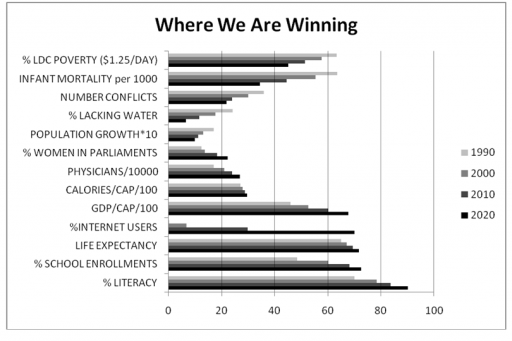How Facts Backfire - (Boston Globe - July 11, 2010)
Recently, a few political scientists have begun to discover a human tendency deeply discouraging to anyone with faith in the power of information. It's this: Facts don't necessarily have the power to change our minds. In a series of studies in 2005 and 2006, researchers at the University of Michigan found that when misinformed people, particularly political partisans, were exposed to corrected facts in news stories, they rarely changed their minds. In fact, they often became even more strongly set in their beliefs. Facts, they found, were not curing misinformation. "The general idea is that it's absolutely threatening to admit you're wrong," says political scientist Brendan Nyhan, lead researcher on the Michigan study. The phenomenon - known as "backfire" - is "a natural defense mechanism to avoid that cognitive dissonance."
Jul 28, 2010
Three Years On, Fault Lines Threaten the World Economy - (Financial Times - July 14, 2010)
As Raghuram Rajan of the University of Chicago Booth School of Business and former chief economist of the International Monetary Fund notes in a thought-provoking new book, the earthquake of the past few years has damaged western economies, while leaving those of emerging countries, particularly Asia, standing. It has also destroyed western prestige. The west has dominated the world economically and intellectually for at least two centuries. That epoch is over. In the US, the post-WW II "deal" centered on full employment and high individual consumption. In Europe, it centered on state-provided welfare. The deal is over.
Amazon Says E-Book Sales Outpace Hardcovers - (Wall St. Journal - July 20, 2010)
Amazon.com Inc. said it reached a milestone, selling more e-books than hardbacks over the past three months. But publishers said it is still too early to gauge for the entire industry whether the growth of e-books is cannibalizing sales of paperback books, a huge and crucial market. Over the past month, the Seattle retailer sold 180 Kindle books for every 100 hardcover books it sold, it said. "That is dramatic evidence of how powerful the e-book is now," said Citigroup analyst Mark Mahaney.
Jul 15, 2010
The state of the future � KurzweilAI
Our study has found eight specific problem areas where things are getting worse: Global Surface Temperature Anomalies, People Voting in Elections (% population of voting age for 15 largest countries), Unemployment (% of total labor force), Fossil fuel energy consumption (% of total), Levels of Corruption (15 largest countries), People killed or injured in terrorist attacks (number), and Refugee population by country or territory of asylum."




